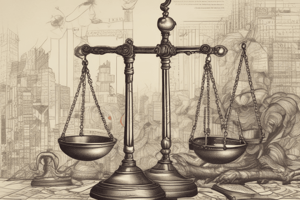Podcast
Questions and Answers
What is the Criminal Code of Canada and what does it contain?
What is the Criminal Code of Canada and what does it contain?
The Criminal Code of Canada is a federal statute that contains the majority of criminal laws passed by Parliament, and it lists all of the offenses, sentences imposed, and procedures to follow.
What is Actus Reus and what does it demonstrate?
What is Actus Reus and what does it demonstrate?
Actus Reus is the guilty act itself, and it demonstrates a voluntary action, omission, or state of being prohibited by law.
Who are parties to an offense and how are they involved in a crime?
Who are parties to an offense and how are they involved in a crime?
Parties to an offense are people not directly involved in a crime but are considered partly responsible for it, as they assist the perpetrator in committing the crime.
What is an attempted crime, and what is required for it?
What is an attempted crime, and what is required for it?
What is the standard of proof required in criminal trials, and what does it mean?
What is the standard of proof required in criminal trials, and what does it mean?
What is the role of Duty Counsel, and what services do they provide?
What is the role of Duty Counsel, and what services do they provide?
What is the role of witnesses in a trial, and what is required of them?
What is the role of witnesses in a trial, and what is required of them?
What is the burden of proof, and who bears it in a criminal trial?
What is the burden of proof, and who bears it in a criminal trial?
What is the primary purpose of a Show Cause Hearing?
What is the primary purpose of a Show Cause Hearing?
What is the difference between a crime scene's centre and its perimeter?
What is the difference between a crime scene's centre and its perimeter?
What is the significance of a Recognizance in a criminal proceeding?
What is the significance of a Recognizance in a criminal proceeding?
What is the purpose of a Chain of Custody in handling evidence?
What is the purpose of a Chain of Custody in handling evidence?
What is the primary distinction between General Intent and Specific Intent?
What is the primary distinction between General Intent and Specific Intent?
What is the role of the Mens Rea element in a crime?
What is the role of the Mens Rea element in a crime?
What is the significance of Actus Reus in a criminal offense?
What is the significance of Actus Reus in a criminal offense?
What are the three conditions necessary for an act to be considered a crime?
What are the three conditions necessary for an act to be considered a crime?
What is the key difference between general intent and specific intent in committing a wrongful act?
What is the key difference between general intent and specific intent in committing a wrongful act?
What is the role of the aider in an offense?
What is the role of the aider in an offense?
What is the primary responsibility of the judge in a courtroom?
What is the primary responsibility of the judge in a courtroom?
What is the main benefit of plea bargaining for the accused?
What is the main benefit of plea bargaining for the accused?
What is the difference between circumstantial and direct evidence?
What is the difference between circumstantial and direct evidence?
What is an example of physical evidence?
What is an example of physical evidence?
What is the role of the defense counselor in a criminal trial?
What is the role of the defense counselor in a criminal trial?
What is the potential drawback of plea bargaining from the public's perspective?
What is the potential drawback of plea bargaining from the public's perspective?
Flashcards are hidden until you start studying
Study Notes
Criminal Code of Canada
- The Criminal Code of Canada is a federal statute that contains the majority of criminal laws passed by Parliament.
- It lists all offenses, sentences imposed, and procedures to follow.
Actus Reus
- Actus reus refers to the act itself or the "guilty act".
- It demonstrates a voluntary action, omission, or state of being prohibited by law.
Parties to an Offense
- Parties to an offense are people not directly involved in a crime but are considered partly responsible for it.
- They assist the perpetrator in committing the crime.
Attempted Crime
- Attempt is the intention to commit a crime, even when the crime is not completed.
- It does not require Actus Reus, but a guilty act begins when preparation turns into an attempted action.
- Mens Rea is established as occurring at the beginning of the attempt.
Reasonable Doubt
- Beyond reasonable doubt means being 101% sure that the person is guilty of the act.
- If one person has reasonable doubt, it means they have created reasonable doubt.
Duty Counsel
- Duty Counsel is a lawyer on duty in a courtroom or police station who gives free legal advice to persons arrested or brought before the court.
Witnesses
- Witnesses testify in court to provide evidence in the case.
- The witness can be called to give evidence by the prosecutor or by the defense.
- The list of Crown witnesses must be given to the defense prior to the trial.
Burden of Proof
- The Crown has the obligation to prove the guilt of the accused beyond a reasonable doubt.
RCMP
- The Royal Canadian Mounted Police (RCMP) was formed in 1873 as the North-West Mounted Police.
- It is the federal police force in Canada, providing investigative and protective services to the federal government.
- It serves as the provincial police in all provinces and territories except Ontario and Quebec.
Definitions
- Show Cause Hearing: a judicial hearing in which the Crown or the accused has to convince the judge to detain or release the accused before trial.
- Physical Evidence: any object, impression, or body element that can be used to prove or disprove facts relating to an offense.
- Recognizance: a guarantee that the accused will appear in court when required, under penalty of a fine up to $500.
- Perimeter: the area surrounding the center of a crime scene, where the offender may have left evidence.
- Contamination: the loss, destruction, or alteration of physical evidence.
- Search Warrant: a court document that gives the police the right to search a specific location.
- Citizen's Arrest: an arrest without a warrant by any person other than a peace officer.
- Latent Fingerprint: a print formed by natural oils and perspiration on the fingertip that is invisible to the naked eye.
- Chain of Custody: the witnessed, written record detailing dates, times, and circumstances of evidence handling by all of the people who had control over items of evidence.
- Centre: the immediate area in which the offense was committed.
- Class Characteristics: general attributes of an object such as type, make, model, size, and style.
Conditions of a Crime
- The act is considered wrong by society.
- The act causes harm to society in general or to people who need protection (minors).
- The harm must be serious.
- The remedy must be handled by the criminal justice system.
Elements of a Crime
- Mens Rea: Intent, Knowledge, Criminal Negligence, Recklessness, Willful Blindness.
- Actus Reus: Voluntary Action, Omission, State of Being.
General/Specific Intent
- General Intent: the desire to commit a wrongful act, with no ulterior motive or purpose.
- Specific Intent: the desire to commit one wrongful act for the sake of accomplishing another.
Parties to an Offense
- Perpetrator
- Aider
- Abettor
- Counselor
- Accessory After the Fact
Players in the Courtroom
- JUDGE:
- In charge of the court
- Listens to what is said in court and decides if the accused is guilty, unless there is a jury that makes this decision instead
- Ensures rules of the courtroom are followed
- Decides sentence if guilty verdict is delivered
- Instructs jury on procedures
- DEFENSE COUNSELOR:
- Represents a person charged with a criminal offense
- Ensures that the accused legal rights are protected
- ACCUSED:
- The person charged with committing a criminal offense
Plea Bargaining
- The accused agrees to plead guilty to a less serious charge if the Crown drops a more serious charge.
- Benefits: shorter trials, saves money, provides police with valuable information, and certainty of accused at least being guilty of something.
- Cons: criminal gets off easy, public loses confidence, not fair to others who aren't offered plea bargain, and police tend to overcharge.
Forms of Evidence
- Circumstantial evidence: allows a judge or jury to infer and accept a fact based on a set of known circumstances.
- Direct Evidence: an eyewitness has seen or heard the alleged events, or some real evidence is provided which proves a fact in question.
- Physical Evidence: consists of physical objects that can be offered into evidence, such as weapons, tools, fingerprints, and blood.
Studying That Suits You
Use AI to generate personalized quizzes and flashcards to suit your learning preferences.




